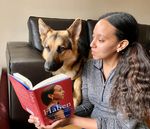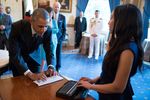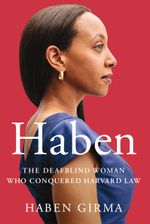
Best-Selling Author
Keynote Speaker

The first Deafblind person to graduate from Harvard Law School, Haben Girma is an award-winning advocate, author, and keynote speaker. She earned the Helen Keller Achievement Award, reached Forbes 30 under 30, and President Obama named her a White House Champion of Change. She believes disability challenges are opportunities for innovation, sparking new technologies that move society forward. Haben travels the globe teaching organizations how to build stronger, resilient, and more connected communities.
A spellbinding speaker, her keynotes have touched the stages of Apple, Bottega Veneta, Disney, Gartner, Google, Microsoft, Oxford University, and many more. Her engaging presentations ignite audiences to make positive changes in their communities. TIME included her as a speaker in TIME100 Talks.
Contact our team with speaking requests or other inquiries. Email [email protected].
What People Say About Haben
"Thank you so much, Haben, for that amazing introduction, and for working to make sure that students with disabilities get a world-class education, just like you have. So please give Haben a big round of applause."
President Barack Obama
"She got out of Harvard, and you know what she's doing? She is an advocate for opportunities for people with disabilities. Because in fact they have enormous ability, and all over the world that ability is going untapped, diminishing their lives and the rest of ours as well. So let's give her a big round!"
President Bill Clinton
"I wish to take this opportunity, as well, to recognize you for your lifelong advocacy for people with disabilities, especially for the deaf-blind community. As a teacher and Prime Minister, I am particularly grateful for your work to ensure that students with disabilities have access to the tools they need to thrive at school and beyond. When our society is inclusive, we are all better off."
Prime Minister Justin Trudeau
Latest Stories




